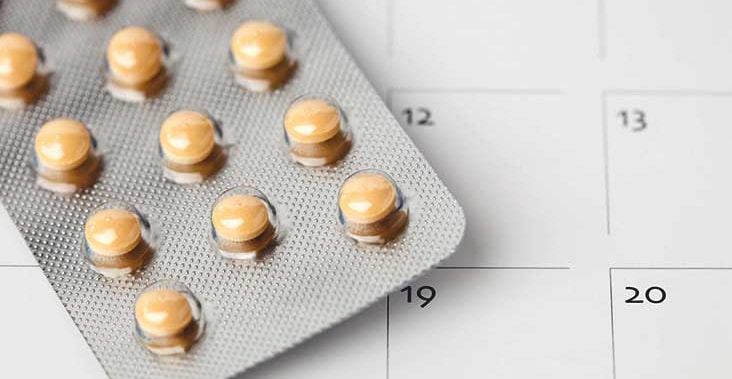Oral contraceptives have properties which you’re clueless about
Female Combined Oral Contraceptives (also known as COCs) are the most popular means of preventing unwanted pregnancy in the world. Today, COCs by right are considered one of the safest and securest birth control methods. An administration of oral contraceptives delivers women from a psychological discomfort, associated with a necessity to be concerned about the prevention of a crisis pregnancy. But the advantages of these useful pills are not limited to a mere ability to defend a woman from ovum fertilization. In fact, trusted hormonal contraceptive pills like Altavera, Falmina, Introvale, have evident non-contraceptive properties, which you’ve never guessed about.
Protection from premenstrual syndrome
A premenstrual syndrome is a complex of somatic and psychogenic disorders that occur 2-14 days before a menstruation and completely disappear after its beginning. This phenomenon is often called an anxious premenstrual syndrome, a periodic syndrome or a premenstrual illness.
PMS in one form or another is observable in three of four women at the age between 15 and 49 years. The PMS symptoms are characterized with a periodicity: sometimes, they are intolerable, sometimes – very mild. The premenstrual syndrome comes from the sensitivity of a female organism to the alterations of hormone levels during a menstrual flux. In order to help women mitigate the unpleasant and all too often painful premenstrual symptoms, doctors often prescribe hormonal birth control pills such as Kelnor, Sronyx, Lo Loestrin Fe or their generic analogs.
It is also known that family planning oral contraceptives are capable of treating the menstrual migraines. Unbearable migraines are often caused by drops in estrogen levels, which typically occur during a menstrual period. For such cases, doctors may recommend taking birth control pills to stop hormonal swings.
Above this, modern COCs can be extremely beneficial for women, suffering from hormone-dependent water retention. This ailment comes out in swellings and rapid weight gaining. Such oral pills can prevent the fluid retention, helping female keep their water balance under control.
Treatment of blemish-prone skin
In your opinion, what does the health of female skin depend on? Obviously, any answer will be perfectly correct: it is dependent upon heredity, a general state of health, an endocrine profile, and a lot of other factors. If a mature woman (not a teenage girl, experiencing a turbulent sexual development) still has not overcome a problem of greasy skin, acne, and pustulations, or currently suffers from an excessive body or facial hair or scalp hair loss, she is likely to have too much testosterone in her organism. In such setting, a doctor may initiate a long-term treatment (6 months or so) with combined oral contraceptives, which generally contain two female hormones (progestin and estrogen) to lower the enhanced level of testosterone in a woman. A dose, therapy regimen, and duration are only determined by a professional after the passing of all appropriate medical tests.
Provision of folic acid
Why not take a COC to increase a folate status? The manufacturers of birth control oral solutions add folic acid (Vitamin B9) to their preparations. This is done to reinforce the action of contraceptive pills and help female patients avoid adverse events, associated with the COC therapy. The folic acid protects the skin against photo aging (a detrimental effect of sun rays). By taking COCs on a daily basis, a woman receives an everyday dose of Vitamin B9. The use of combined oral contraceptives enriched with the folic acid even reduces a risk of congenital anomalies in a fetus after the treatment discontinuation. Still, it is not advisable to take birth control oral tablets without a consultation with your health care provider.
Management of heavy menstrual bleeding

It is important to note that a menstruation can only be considered normal when it does not influence a woman’s working efficiency and well-being-activity-mood. Severe pains and generous menstrual bleeding is a serious departure from the norm.
Effective oral contraceptives like Azurette, Natazia, Levora or their generic alternatives, can help female patients manage painful or abundant menstruations. Such tablets can decrease the volume of menstrual haemorrhage, thus positively influencing a woman’s life quality and overall health.
Prophylaxis of oncology diseases
It is clinically proven that the majority of hormonal oral contraceptives minimize the risk of bowel cancer, ovarian cancer, and endometrial cancer. The risk diminishes proportionately with the duration of a therapy with oral hormonal contraceptives. It is established that the result of a COCs’ beneficial impact on a female organism remains several years after the discontinuation!
It sounds unbelievable, but women, who take COCs regularly, tend to live 10-15 years longer compared to those, who do not use birth-control oral tablets. It is explained by the fact that combined oral contraceptives such as Trivora, Previfem, Ogestrel, contain synthetic hormones, which are effective against many grave conditions including cancerous diseases and gynecological disorders.
Hormonal contraceptives help women avoid inflammatory disorders in the pelvic organs. A progestogen component of contraceptives has a specific effect on the consistency of the cervical mucus (it decreases the widening of the cervical canal of the uterus), thus preventing the pathogenic germs from penetrating inside.
Defense against abdominal pregnancy
By suppressing ovulation and blocking the activity of fallopian tubes, oral contraceptives prevent the development of an ectopic pregnancy, provided a female never misses a prescribed dose and is always punctual in taking it.
Bone-sparing properties
Family planning oral contraceptives have a positive effect on osteoporosis by preventing the decline in bone mass, which often begins at the age of 30-40 years in women, i.e. in sexually active females with a good chance of getting pregnant. Over years, a female body decelerates the production of estrogen, which is directly responsible for the bone mineral density. Estrogen, found in many oral contraceptives (Falmina, Estrostep Fe, Femcon Fe), conserves the bone mass by promoting the activity of osteoblasts – the cells that form our bone tissue.
Alleviation of polycystic ovarian syndrome
Professionals abbreviate this disease for PCOS. This condition (which is triggered by a hormonal imbalance) is a culprit of irregular menstruations, acne outbreaks, an excessive body and facial hair, cystic ovary, and infertility. And each of these symptoms that can be managed by combined oral contraceptives. Women diagnosed with PCOS cannot ovulate regularly because one of their two ovaries does not produce an egg every month. This phenomenon is associated with a knot on the uterine lining (also known as endometrial hyperplasia). In COCs, progestin inhibits the action of estrogen (which is primarily responsible for the thickening of the endometrium during preparation for a pregnancy), and this protects a female patient from an endometrial hyperplasia.
Evidently, combined oral contraceptives offer many advantages beyond preventing an unintended pregnancy. Nevertheless, hormonal contraception can only be prescribed and adjusted by a well-trained gynecologist or a thyroid specialist.







